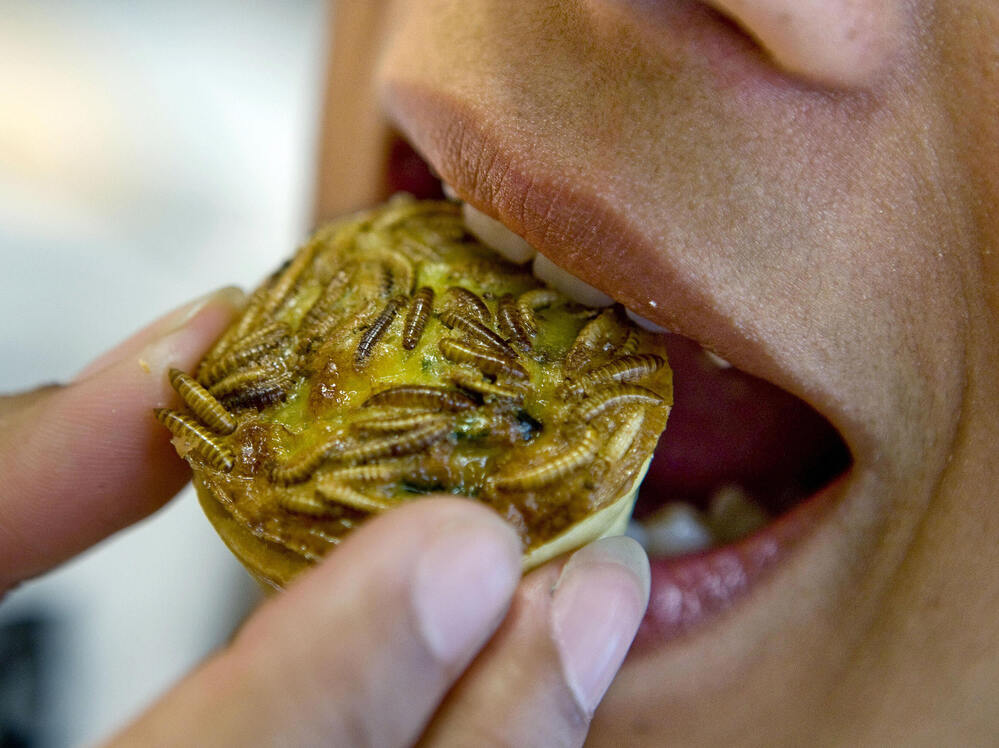 Enlarge image i
Enlarge image i A woman takes a bite of a mealworm pie in the Hague, Netherlands.

A woman takes a bite of a mealworm pie in the Hague, Netherlands.
Want to eat sustainably? Then eat bugs.
That's the word from the Dutch, who are doing their best to make a scientific case for the environmental benefits of insect proteins. Reduce greenhouse gases? Check. Produce more edible protein while using less land than more traditional livestock? Check.
That last one's an easy target; livestock take up about three-quarters of the world's agricultural land. And livestock production is also a major source of greenhouse gases, accounting for about 15 percent of emissions caused by human activity. (See our hamburger infographic for more details.)
But no one had run the numbers on bugs as livestock, until now.
The bugs in question are mealworms, actually larvae of the mealworm beetle, Tenebrio molitor. Mealworms are no strangers to Americans; they're common in nature, often used as fishing bait, and sold in pet stores as food for reptiles and fish. But most people don't consider snacking on the wriggling tan larvae themselves.
In order to persuade those of us who still savor a medium-rare steak, Dennis Oonincx, a graduate student at Wageningen University, has been hard at work calculating the environmental impact of meat production from mealworm farming. He measured land use, energy needs, and greenhouse gas emissions, and published his results in the journal PLoS ONE.
When it came to land use and effect on greenhouse gases, the mealworms soundly beat dairy production, pork, chicken and beef. The mealworms needed just 10 percent of the land needed to produce an equivalent amount of beef, including the land needed to grow feed grains and forage. (Mealworms happily feed on grains and carrots.)
But it took more energy to produce a kilo of bug protein than it did to get edible protein from milk or chicken. Indeed, the tiny critters were more on par with pork or beef. That may be because mealworms need to be warm to grow. More than half of the bugs' energy use went for gas heat and electric light. The other half went for production and transport of carrots and grain.
Undaunted, Oonincx and his colleagues conclude that mealworms "produce much less [greenhouse gas] and require much less land, than chickens, pigs and cattle. With land availability being the most stringent limitation in sustainably feeding the world's population, this study clearly shows that mealworm should be considered as a more sustainable alternative to milk, chicken, pork, and beef."
You may not be convinced. But in the Netherlands, at least one restaurant has featured mealworms as part of its bug buffet. (Teri Schultz covered the feast earlier this year for The Salt.) The diners gave rave reviews.
And if you're not ready to eat bugs, farmed salmon sure is. Aquaculturists are experimenting with using ranched flies as food in commercial fish farming. They're also under consideration as emergency food for refugees.
is life better today than it was in the early 1900's CreateDebate Debate about is life better today than it was in the early 1900's: yes or no barfblog safe food from farm to fork My favorite food safety-related app is Poop the World its a bit like playing Tony Hawk Pro Skater with, uh, poops. The opening screen says, Get started! UN urges global move to meat and dairy-free diet Environment ... UN urges global move to meat and dairy-free diet. Lesser consumption of animal products is necessary to save the world from the worst impacts of climate ... Istanbul's 'Accidentally Ecofriendly' Architects : TreeHugger Architect Hasan allar says he doesn't incorporate 'green' features in his buildings because they're environmentally friendly -- he only uses them if they 'make ... Klout The Standard for Influence Klout is the Standard for Influence. Join Klout to discover your influence and compare with others you may know. WRAP UK Organisation helping businesses and individuals reduce waste, develop sustainable products and use resources in an efficient way. The focus is on packaging, food ... How Meat Contributes to Global Warming: Scientific American Producing beef for the table has a surprising environmental cost: it releases prodigious amounts of heat-trapping greenhouse gases Intelligence quotient - Wikipedia, the free encyclopedia An intelligence quotient, or IQ, is a score derived from one of several standardized tests designed to assess intelligence. The abbreviation "IQ" comes from the ... Natural environment - Wikipedia, the free encyclopedia The natural environment encompasses all living and non-living things occurring naturally on Earth or some region thereof. It is an environment that encompasses the ... Mealworms, Red Wigglers, Red Worms at Worm Man's Worm and Crickets ... Mealworms and Red Worms from Worm Man's Worm Farm. Mealworms and worms are guaranteed to arrive alive.
No comments:
Post a Comment